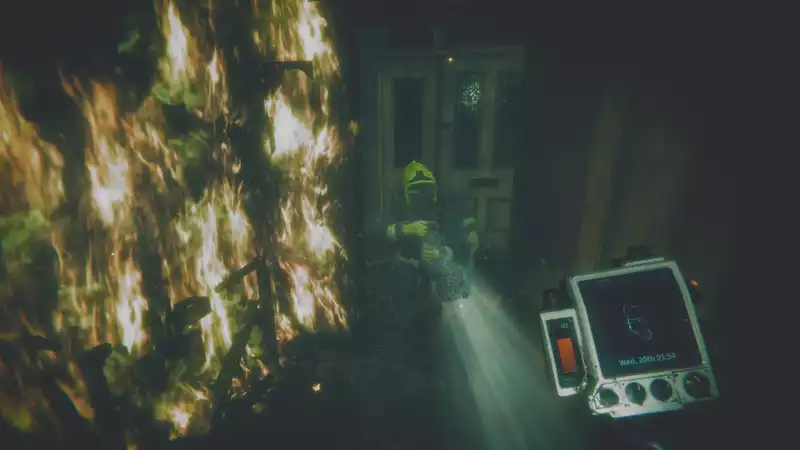A time traveler should be able to stop a house fire with ease. All you have to do is fix a faulty electrical wiring or stomp out a cigarette butt."
This is the situation you face in "The Eternal Thread," but in this timeline, you must prevent the victims of the fire with the power of kindness alone.You are presented with a series of events that take place over the course of a week, and before you know it, it has evolved into a tragic fire. Thankfully, you are given the skills to cunningly edit some of the decisions made among the residents, ideally creating a butterfly effect that allows the residents to escape alive. Eternal Threads is a showcase of second chances, inviting you to reflect on the times in your life when you lost your cool.
There is an apparent science fiction look that explains time manipulation. You are cast in some sort of chrononaut in a seedy future where time travel has contaminated the fourth dimension with all sorts of radiation that erodes reality. All is ambiguous, but "Eternal Threads" takes you to a house in Northern England in 2015, where a landlord and a handful of troubled college students are in the prime of their twenties.
From there, "Eternal Threads" takes the form of a somber 3D stage play with ghostly actors. Cue one of the scenes scattered throughout the timeline, a midnight game of billiards or a smoke on the patio, to explore the nuances of this particular group dynamic. Occasionally, your time device will chime in and ask if you want to replace one climax of the action with another. Instead of drunkenly texting your ex-girlfriend, maybe Tom will have second thoughts and head off to bed. If enough of these bits and pieces are interwoven in the right order, eventually everyone survives the fire.
Such games live and die by their characters and the mystery at the core of the drama, and while the inhabitants of this house are not exactly a Beckettian monolith, I found myself rooting for them. Neil is a short-tempered character rooted in tender grief, and Raquel needs to stop blaming herself for things that are not her fault. The plot is conveniently constructed so that when each character achieves self-realization, they miraculously escape from the burning building. (If only real life rewarded emotional happiness with the inexplicable ability to avoid physical catastrophe.)
Eternal Threads weaves in a few points of intrigue along the way - seriously, what is going on with that door in the basement - but there are no creepy curve balls buried in the code. Don't think there are arsonists among us.
However, you will have to do a little detective work. As you search the apartment, you will be prompted to pick up notes, postcards, and smartphones. These contain important contextual information and fill in the mystery. (Reminds me a little of "Gone Home.") Developer Cosmonaut Studios uses this mechanism as a canvas for a clever time travel trick that tickles the brain. Adjust the residents' decisions, and the rooms may look quite different, but that's usually a sign that you're on the right track. These tricks are necessary to mitigate Eternal Threads' brooding, prehistoric graphic quality; the NPC models have a distinctly Second Life feel, which can be difficult to overcome when you're asked to buy into their bone-chilling suffering. That said, the voice actors generally do a good job.
But "Eternal Threads" doesn't allow for much of a straight-ahead, gumshoe-style through-thing. The true ending I achieved came very naturally by simply watching all the scenes and editing out any junctures that seemed unsatisfactory. The "door" I mentioned earlier is found after one of the characters tells you where it is, and the key is found. There is only one kind of decision to make: the decision to watch and react to cutscenes. If you are looking for an Obradin-like experience, if you have to look through each still photo with bloodshot eyes and draw arcane conclusions about the dusky sailors, then "Eternal Threads" will not satisfy your desire. Cosmonaut wants to tell a story first and foremost. Gameplay is secondary.
That lack of substance permeates the finale, which ends with a ridiculous cliffhanger that would make a sequel a possibility. Hinting at a grand science fiction conspiracy that could not be contained within the confines of a dormitory, it felt as if Cosmonaut was content to postpone the concrete development of its worldview.
I wish they would give this piece another shot. Eternal Threads consisted of six main characters and about a dozen rooms, and it is easy to imagine Cosmonaut expanding on that compact format and further exploring the intersecting vectors in the time novel in a sequel that feels smarter than Eternal Threads. What the studio now has is a fascinating character study, but it holds my hand too much. Making mistakes is what time travel is all about.
.

Comments